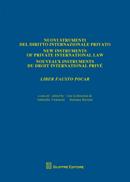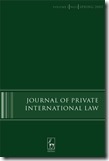Andrew Dickinson is a Solicitor Advocate, Consultant to Clifford Chance LLP and Visiting Fellow in Private International Law at the British Institute of International & Comparative Law. His commentary on the Rome II Regulation is published by Oxford University Press.
The views expressed below are the author’s personal, initial reaction to the judgment.
Scaramanga: “A duel between titans, my golden gun against your Walther PPK. Each of us with a 50-50 chance.”
James Bond: “Six bullets to your one?”
Scaramanga: “I only need one.”
(from The Man with the Golden Gun (1974))
Reading the decision of the Court of Justice in the West Tankers case is a little like watching a sub-standard James Bond Movie (The World is Not Enough, perhaps). You know the outcome, but do not know exactly how 007 will overcome the latest plan for global domination. You check your watch, hoping that he will get on with it before last orders at the bar. So it is here, but in reverse. The common law deploys its latest weapon to defeat a perceived attempt to pervert the course of justice, but it is defeated by the greater might of European Community law. The only reason to read to the end is to see exactly how the deed is done and the corpse disposed of.
The Court’s reasoning is brief, more than can be said of some of Mr Bond’s adventures. It is, nevertheless, unconvincing.
The Court concludes, it is submitted correctly, that the subject matter of the English proceedings falls outside the scope of the Brussels I Regulation (para 23) whereas the (principal) subject matter of the Italian proceedings falls within scope (para 26). The second of these findings, in accordance with the reasoning in the Van Uden case, would arguably have been sufficient in itself to dispose of the question presented to the Court in West Tankers, having regard to the very broad way in which the injunction had been framed by the English Court (preventing the taking of any steps in connection with the Italian case).
No doubt mindful of a more targeted weapon being produced by the enemy (perhaps an injunction to restrain a party from making any application or submission before the Italian court contesting the validity or applicability of the arbitration agreement) the Court felt it necessary to supplement its reasoning with the propositions that (a) a preliminary issue concerning the applicability of an arbitration agreement, including in particular its validity also comes within the scope of application (para 26), (b) under the Brussels I Regulation, this preliminary issue is exclusively a matter for the court (here, the Italian court) seised of the proceedings in which the issue is raised (para 27), and (c) the anti-suit injunction constitutes an unwarranted interference in the Italian court’s decision making process (paras 28-30).
It cannot be denied that an anti-suit injunction, whether in the wider or narrower form suggested above, indirectly interferes with the foreign proceedings to which it refers. For some, that is enough to condemn it as an unwarranted interference in the affairs of a foreign sovereign State. It may be questioned, however, whether an injunction in the narrower form woud interfere in any way with the effectiveness of Community law, in the form of the Brussels I Regulation. That, of course, is the only question that the Court could address.
We can accept, for the sake of argument at least, that (putative) competence under the Regulation’s rules of jurisdiction carries with it competence to determine any question of fact or law bearing on the application of those rules. The Court, drawing succour from a passage in the Evrigenis and Kerameus Report, no less, concludes that questions concerning the validity or application of an arbitration agreement relate to the scope of application of the Regulation and, therefore, fall within this category (paras 26 and 29).
The conclusion seems, however, open to several objections. First, the Regulation excludes “arbitration” (Art 1(2)(d)). The Court accepts that proceedings founded on an arbitration agreement, and having therefore as their subject matter the validity and application of an arbitration agreement, fall outside the the Regulation’s scope (para 23). The Court fails, however, to explain why a preliminary issue of precisely the same character is brought within scope. As the Court recognised in its decision in Hoffmann v Krieg, a decision may relate partly to matters within scope and partly to matters outside – the fact that the former may be said to constitute the principal subject matter of proceedings does not (or at least has never before been understood by the author to) require a decision, often a separate decision, on the latter in the same case to be recognised under the Regulation. If the Court was intending to develop a theory of parasitic jurisdiction/recognition in this context (cf. Schlosser Report, para 64; Van Uden, para 32), it should have made this clear and explained its reasoning in greater detail.
Secondly, the Court’s view that the right to apply the Regulation includes the right to determine its scope, fails to lift its argument to a higher level. As the decision in Van Uden makes clear, the assessment whether the subject matter of proceedings falls within the scope of the Regulation (and outside the scope of the arbitration exception in Art 1(2)(d)) cannot be influenced by the fact that the parties may have chosen arbitration as their method of dispute resolution or that arbitration proceedings have been commenced. Accordingly, the Italian court could determine that the proceedings before it fell outside the arbitration exception and within scope without the need to characterise the preliminary issue, still less to treat that issue as independently or parasitically falling within the scope of the Regulation.
Thirdly, as the Court admitted (para 33), the Italian court in considering whether to give effect to an arbitration agreement between the parties is not applying a rule in the Brussels I Regulation but, instead, is applying the rules contained in the New York Convention, as a convention which (to the extent that its effect is not excluded from scope by Art 1(2)(d)) takes priority over the Regulation’s rules by virtue of Art 71(1) of the Regulation. On this view, the anti-suit injunction (at least in the narrower form suggested above) interferes only with the proper functioning of that Convention rather than with the Regulation and does not fall foul of the EC Treaty. Even if, as the Court appeared to assume, it is contrary to the letter or spirit of the New York Convention to preclude a Contracting State court from carrying out its functions under Art II(3), that question was not one that the ECJ had power to determine. Without the New York Convention, there might be scope for argument that the Regulation’s rules of jurisdiction are somehow modified by an arbitration agreement (cf. Van Uden, para 24), Where the New York Convention applies, the Regulation’s rules provide merely the preliminary course and do not apply at all to determine the validity or effect of the arbitration agreement.
Returning to the Court’s first conclusion, that the English proceedings to obtain an injunction fell outside the Regulation’s scope, it may be thought to follow that, equally, proceedings in a Member State court for a declaration that the parties have entered into a valid arbitration agreement or for damages following breach of an arbitration agreement would also fall outside scope, having as their subject matter the arbitration agreement (whether it is seen as having a contractual or quasi-public law effect). On that view, judgments in such proceedings would not be recognised or enforceable under the Regulation but, in view of this characteristic, might also be argued not to interfere directly or indirectly with the “right” of another Member State court to determine its own jurisdiction under the Regulation. These questions must be faced by the Englsh courts and perhaps even the ECJ in years to come. Further, the possibility would appear to remain open of taking steps (by default processes, if necessary, as occurred in the West Tankers case) to establish an arbitration tribunal for the purpose not only of disposing swiftly of the substantive dispute between the parties in such a way as to create an award enforceable under the New York Convention, but of obtaining an enforceable award for an anti-suit injunction or damages for breach of the arbitration agreement. Although arbitrators sitting in Member States are bound, to a certain extent, to apply EC law (Case C-126/97, Eco Swiss), an interesting debate may emerge as to whether they are obliged to comply with the principle of “mutual trust” embodied in the Brussels I Regulation.
Finally, if some satisfaction is to be gained from the West Tankers judgment, it is that arbitration and jurisdiction agreements have been restored to greater parity in terms of securing their effectiveness within the Community legal order. One curious side-product of the ECJ’s decisions in Gasser and Turner was that the potential availability of an anti-suit injunction was thought to provide a reason for choosing arbitration instead of judicial resolution. West Tankers has once again levelled the playing field in this respect, at least within the legal systems of the Member States. The unsatisfactory consequences of Gasser and the risk of a flight to dispute resolution outside the European Community, by whatever method, must be addressed head on in the forthcoming review of the Brussels I Regulation.



 The
The